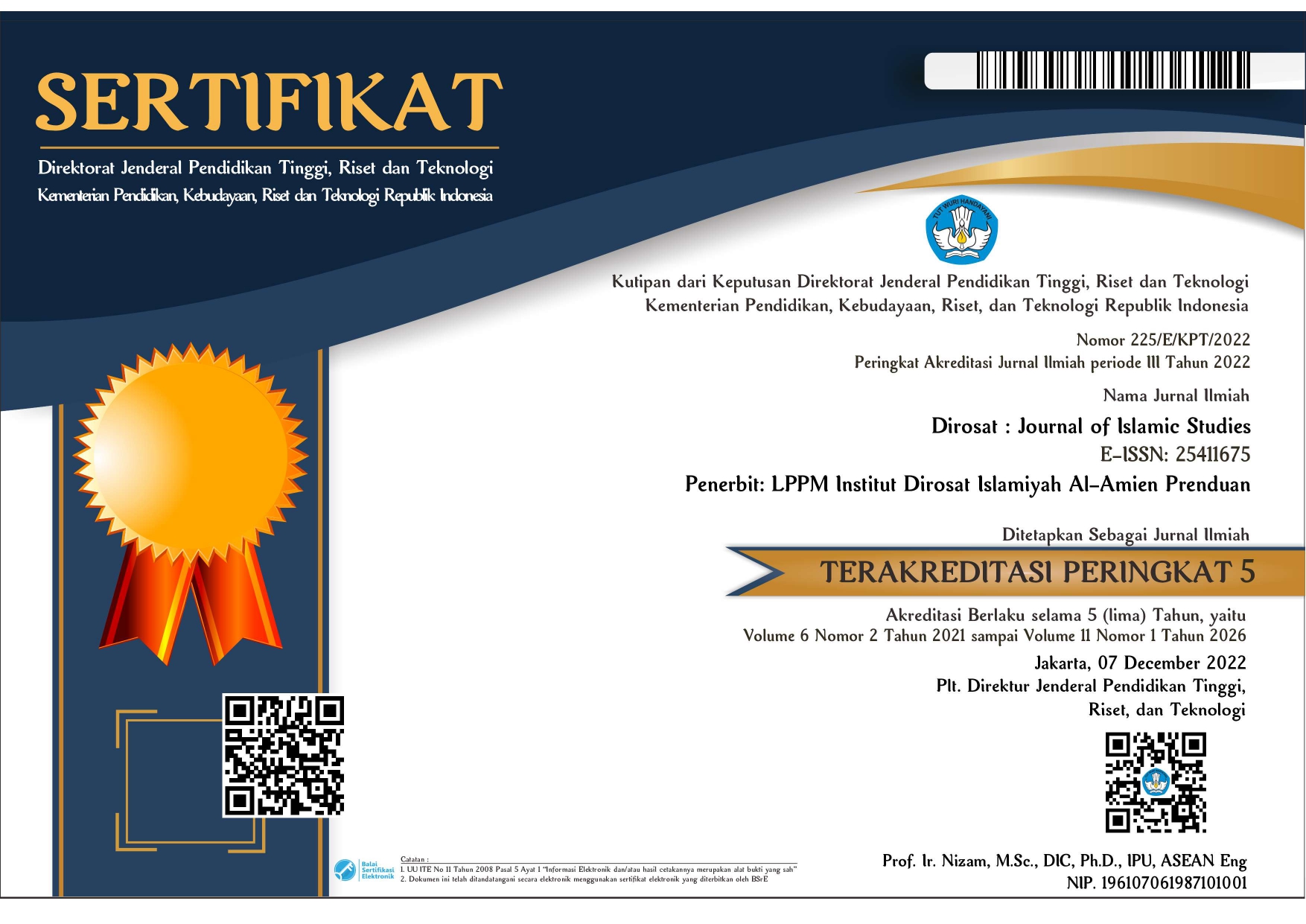Rutinitas H{alaqah Qira<’Ah Sab’ah (Kajian Living Qur’a>N Di Pondok Pesantren Zainul Ibad Prenduan Sumenep Madura)
Abstract
The focus of the problems that will be discussed in this research article are first, what is the background of the routine activities of the h}alaqah qira>'ah sab'ah at Zainul Ibad Prenduan Islamic Boarding School? second, how is the implementation of the routine activities of the h}alaqah qira>'ah sab'ah at the Zainul Ibad Prenduan Islamic Boarding School? To answer the questions above, this study was designed using a qualitative approach with a phenomenological research type. The data collection techniques used in this study were observation, interviews, and documentation, while the researchers were the key instruments and took caretakers of the Zainul Ibad Prenduan Islamic boarding school and several female students to serve as research samples. From the results of this study it was found that first, the background to the routine activities of the h}alaqah qira>'ah sab'ah is to add insight and basic knowledge for female students and to maintain the preservation of the qira>'ah sab'ah science so that it does not become extinct and is always in the memory of Kyai and his students. Second, the method used in the process of routine halaqah qira>'ah sab'ah activities uses the jama' kubra> or t}ori>qotul jama>'i stages method, which is a system of combining the seven qurra>' imams. This process is carried out by talaqqi per verse according to the order of the Imam in one meeting every week as much as one page. When analyzed, if the learning process takes place in 20 meetings, then the learning will complete 1 juz
Keywords
References
Adhi Kusumastuti dan Ahmad Mustamil Khoiron. Metode Penelitian Kualitatif. Semarang: Lembaga Pendidikan Sukarno Pressindo (LPSP), 2019.
Al-Qattan, Manna Khalil. Studi Ilmu-Ilmu Qur’an. terj. Mudzakir. Jakarta: Pustaka Litera AntarNusa, 2004.
Ash Shaabuuniy, Muhammad Ali. Studi Ilmu Al-Qur’an. terj. Aminuddin. Cet 1. Bandung: CV PUSTAKA SETIA, 1998.
Cece Abdulwaly. Hafal Qur’an Meski Sibuk Kuliah. Sukabumi: Farha Pustaka, 2019.
Departemen Agama RI. Al-Qur’an Tajwid dan Terjemahnya, t.t.
Muslimin, Achmad. “Implementasi Metode Halaqah Dan Resitasi Dalam Tahfidz AL-Quran Di SDIT El-Haq
Banjarsari Buduran Sidoarjo.†Adabiyah : Jurnal Pendidikan Islam, vol., no. Vol 1, No 1 (2015): Adabiyah: Jurnal Pendidikan Islam (2015): 55–62.
Nafhaturrodhiyah dan Heni Susilawati. “Pembelajaran Qira>’ah Sab’ah (Studi Living Qur’a>n di Pondok Pesantren Zainul Ibad Prenduan Sumenep Madura.†Handphone Andorid, 14 Juli 2018.
Rahim, Hamdi Abdur. “Urgensi Halaqah Untuk Akselerasi Dakwah.†Ath Thariq Jurnal Dakwah dan Komunikasi, vol., no. Vol 2 No 2 (2018): Ath-Thariq (2018): 315–331.
Rola Nurzahrita. “Implementasi Metode Pembelajaran Qira’at Ssb’ah Di Sekolah Pendidikan Dan Pengembangan Al-Qur’an Di Kota Banda Aceh.†Universitas Islam Negeri Ar-Raniry Dsrussalam, Banda Aceh, 2019.
Shihab, Moh Quraish. Kaidah tafsir: syarat, ketentuan, dan aturan yang patut anda ketahui dalam memahami ayat-ayat al-Qur’an: dilengkapi penjelasan kritis tentang hermeneutika dalam penafsiran al-Qur’an. Cetakan III. Pisangan, Ciputat, Tangerang: Lentera Hati, 2015.
“Hadits Sunan Ibnu Majah No. 209 - Kitab Mukadimah,†t.t.
DOI: 10.28944/dirosat.v4i2.956
Refbacks
- There are currently no refbacks.

This work is licensed under a Creative Commons Attribution-NonCommercial-ShareAlike 4.0 International License.








